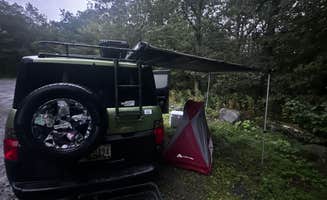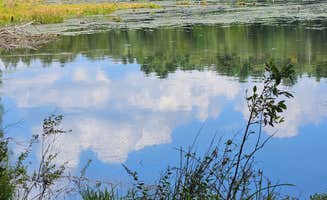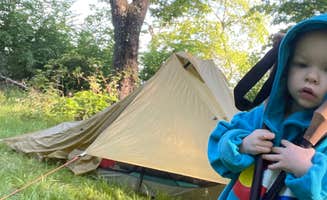Dispersed camping near Clarks Summit, Pennsylvania offers remote wilderness experiences within the Pocono Mountains region. Located at elevations between 1,200-2,000 feet, these primitive camping areas experience significant seasonal temperature variations with summer highs averaging 80°F and winter lows often below freezing. Most sites lack cell service and require campers to bring all necessary supplies, including water purification equipment.
What to do
Hiking trail networks: The Thunder Swamp Trailhead provides direct access to extensive trail systems. A regular visitor notes, "Trailhead parking was chill for a night. No trouble. Tons of hiking. Went down Saw Creek trail to a marsh." Many trails connect to the Delaware State Forest, creating multi-day backpacking possibilities.
Lakeside activities: At Hickok Brook, campers can enjoy fishing and paddling opportunities. The site offers limited waterfront camping spots perfect for kayakers and anglers. The area remains relatively uncrowded even during peak times, with one camper reporting, "It's a hike back to town... there is a small town 10 minutes away. Eldred, NY."
Wildlife viewing: The region supports diverse wildlife including white-tailed deer, black bears, and various bird species. Dawn and dusk provide optimal viewing times. Always store food properly in bear-resistant containers, especially at designated backpacking sites along the Appalachian Trail.
What campers like
Solitude and quiet: Most dispersed camping areas near Clarks Summit provide peaceful experiences away from crowds. At Thunder Swamp Trailhead, one camper mentioned, "It's a gravel parking lot. Plenty of shade. No one bothered me." This makes it ideal for those seeking minimal interaction with other campers.
Natural settings: The Appalachian Trail Designated Backpacker Campsite 2 offers primitive camping surrounded by mature forest. A hiker observed, "We camped nearer to others but there are secluded spots too. We'll maintained w bear boxes provided. Good trees for hammocking." The site balances community and privacy.
Minimal regulations: Most dispersed sites have fewer restrictions than developed campgrounds, though specific rules vary by location. For example, fires may be prohibited in certain areas during dry conditions, and permits are required for some locations.
What you should know
Road conditions: Access roads to many sites require high-clearance vehicles. At Hickok Brook, a camper warned, "I drove in thinking that there would be flat places to park a very rugged camper in my full ton diesel pickup. The road is very rough with huge potholes so good clearance is a must."
Water sources: Most dispersed sites lack reliable water. At the Appalachian Trail Campsite, hikers must carry sufficient water or be prepared to filter from streams when available. An AT hiker commented, "No water (nearest is sunfish pound- easy hike about a 1 round trip)."
Permits and regulations: Camping regulations vary by jurisdiction. In New York state areas, permits are often required as one camper learned: "Where I originally camped was not a spot, according to Ranger. Had to move next to the lake. Need a permit on NY state land. Contact Rangers office of whatever county."
Tips for camping with families
Space limitations: Many dispersed sites offer limited flat areas suitable for multiple tents. One camper at Appalachian Trail Designated Backpacker Campsite 2 noted, "I gave the site only four stars because there's no water nearby, and the views are only mediocre. Also it's a little on the small and sloped side for tent camping."
Safety preparations: Families should bring first aid supplies, emergency communication devices, and extra food due to the remote nature of these sites. Cell service is unreliable throughout the region.
Wildlife awareness: Teach children proper behavior in bear country, including staying close to adults and never approaching wildlife. Use provided bear boxes when available or bring bear canisters for food storage.
Tips from RVers
Size restrictions: Most dispersed camping areas near Clarks Summit cannot accommodate large RVs or trailers. A camper at Hickok Brook advised, "It's not a good spot for car camping but you could conceivably drive up to the spots and pull off the road to put up a small tent somewhere. Very gorgeous but not rv friendly."
Limited space: Sites typically have room for only a few vehicles. "There are only 3 spots where we are. No motor vehicles beyond where I'm camping," reported one visitor about Hickok Brook.
Self-contained camping: With no hookups, water sources, or dump stations available, RVers must be completely self-sufficient and prepared to pack out all waste. Small campervans and truck campers fare better than larger rigs on these narrow forest roads.




